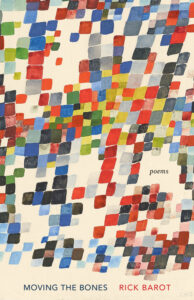Rick Barot
The Singing
Rick Barot’s poem “The Singing” takes place in the humdrum, relatable setting of the waiting room at a car dealership. But the unexpected occurs when one woman’s soft humming builds into strange, full-throated singing. Curiosity, wonder, anger, and dread spill over, forcing you to face the same dilemma as the narrator: What can you do when reality defies your control?
We’re pleased to offer Rick Barot’s poem and invite you to subscribe to Pádraig’s weekly Poetry Unbound Substack newsletter, read the Poetry Unbound book, or listen to past episodes of the podcast. We also have two books coming out in early 2025 — Kitchen Hymns (new poems from Pádraig) and 44 Poems on Being with Each Other (new essays by Pádraig). You can pre-order them wherever you buy books.
Guest

Rick Barot was born in the Philippines, grew up in the San Francisco Bay Area, and attended Wesleyan University and The Iowa Writers’ Workshop at the University of Iowa. Barot teaches at Pacific Lutheran University and is the director of the Rainier Writing Workshop, the low-residency MFA in Creative Writing at Pacific Lutheran University. His fourth book of poems, The Galleons, was published by Milkweed Editions in 2020, and his most recent collection is Moving the Bones.
Transcript
Transcription by Alletta Cooper
Pádraig Ó Tuama: My name is Pádraig Ó Tuama. And my friends tell me that I’m the kind of person that they usually would not want to sit next to on a plane if they didn’t know me, because my preference is to talk to whoever’s next to me. On a flight recently, somebody leaned over and tapped me on the shoulder, and said, Where did you get your slippers? And I was delighted to talk to them. Another time somebody tapped me on their shoulder and said, Are you writing a poem? And I was. She was an English teacher, and then she came along to the poetry reading I was giving the next night. This, to my mind, just indicates how interesting the world is and probably indicates the kind of poems that I gravitate to sometimes in Poetry Unbound. I love poems that describe when somebody in the room does something that was unexpected, that causes a ripple amongst the other people there. They’re not sure what to do and they’ll have a story to tell, but also it’ll reveal something about them.
[music: “Praise the Rain” by Gautam Srikishan]
“The Singing” by Rick Barot.
“There are eight of us in the waiting room
of the service department in the car dealership.
Some are reading newspapers, or scrolling on their phones,
or watching the TV with the news on, the sound
off. There’s a woman sitting in the corner
looking down at her phone. She is humming, very softly.
The room is more like a lounge just off the lobby
of a nice hotel, with tall plants and couches.
I am reading paperwork from my job, one part of my mind
thinking about that, another part thinking
about the things the mechanic might find wrong
with my car, acting like it has a bad cough.
The humming woman is sitting near enough
that I can hear her humming begin to take on words
in a language I don’t know. It sounds
like an African language, its soft registers making me think
the woman is singing a lullaby or a nostalgic song
about a landscape, though for all I know
she might be singing about a war or the clanging streets
of a city. In the half hour all of us are there
together, no one entering the room, no one called away,
the woman’s humming begins to turn
insistently into singing. As her voice gets louder and lifts
into what must be the song’s sad ecstasy,
an equal disquiet seems to thicken the air of the room.
Everyone is listening. No one is looking
at her, but everyone is now aware that she is there,
brought into this consensus. At first the singing
is a novel kind of delight. The unabashed woman is a story
we will get to tell about later. But as it goes on,
demanding our attention, it becomes another thing.
In one part of the room is a coffee station. In another part
is a popcorn machine where you can help
yourself to little bags of popcorn. On the TV, the face
of the man speaking looks like a square of ham.
The woman is looking down at her phone
and singing. It is the same song, looping, the same eerie
rise and fall. Someone, I think, will walk to her and tell her
to stop. Someone, I think, will tell someone
in the car dealership to make her stop. Someone will call
the police, or think of doing so, as one part
of my mind is doing now, crouched in a declivity
of shame. With kind curiosity, I also want
to go to the woman and ask her what the song is about.
One span of the song sounds like a scorched house,
while another quavers upward, as when
the plane sharply banks, filling the window with the sky.
No one in the room has moved for a long time.
There is no resolving the moment until it ends.
Whether the woman is aware of the rest of us, she does not
give any indication by lowering her voice.
She sings. She sings. She sings. She sings.”
[music: “Toothless Slope” by Blue Dot Sessions]
I love this poem by Rick Barot. The tone of it is almost like narration. It reads like prose. But one of the things that occurs a level deeper than the simple narration is a particular awareness of place and experience. So he does very interesting emotional things with how he modifies describing the room where they are, and then describing what’s happening in the room. And he allows a certain panic to build up in you, where you feel his own panic. And so therefore it’s an experience of time, that’s really being narrated. That’s the particular poetic artistry, I think, that’s present in the unfolding way that’s described. It’s unhurried, you know, the scene is set. There’s eight people in the waiting room. And some are on their phones, and some are reading newspapers. And the room is described with generosity, “like a lounge just off the lobby / of a nice hotel with tall plants and couches.” And he’s reading the paperwork for his job. But actually he’s got a small worry, a quiet dread in him, too, about that cough that’s been coming from his car. And maybe underneath that, then, there’s the worry about how much is this going to cost?
Back to the woman who’s sitting near him, she’s “sitting near enough / that I can hear her humming begin to take on words / in a language I don’t know.” His speculation then about what is the language. He wonders if it’s an African language, but he doesn’t know. And what’s she’s singing? What we’re hearing here is his interest in describing what’s on the surface, and then what’s under the surface, and then the feelings about the things you don’t know: I don’t know how much the car is going to cost. I don’t know how long I’m going to be here. I don’t know if this person’s going to continue singing. I don’t know how to respond to that. I don’t know what she’s singing about. This poem is three, four, five layers deep and looks at what happens in a waiting room. It’s almost like a waiting room for life. You can’t control other people. And this is an experiment, really, of opening up with, I think, great courage, the various things that go through your mind when something unexpected happens.
[music: “Kindling” by Gautam Srikishan]
I’ve been reading Rick Barot’s work for a number of years. I think this book from which this comes — it’s called Moving the Bones — I think it’s his fifth book. He was born in the Philippines and then moved to the States. And there’s something about the simplicity of this poem, as well as the absolute exposure of the rage and projection and shame that happens inside yourself when you find yourself thinking things that you don’t want to think. “Crouched in a declivity / of shame.” You know, this is a man of color in a situation where he’s thinking of calling the cops. He’s fantasizing about someone calling the cops on somebody who’s just singing. That, to my mind is, is part of the way within which rage is occurring in him. I think what he’s doing is exposing the inner mechanics of his mind to go, oh my God, what was I thinking? And then to go, No, let me practice something better, “kind curiosity.” There’s something about all of that that really demonstrates to me skill as a poet. He’s not hiding behind technique, he is exposing layers upon layers.
In many ways, this is a poem less about what’s occurring in the room and more about control. We are always going to find ourselves in situations where something untroubling is happening that is nonetheless troubling us. Because it brings to the surface our desire for social norms or conventions, or what’s the rule, or who should be in charge here, or I don’t understand what’s going on.
He allows all kinds of hostilities to come across in himself. Even right at the beginning when he’s talking about what’s going on in the song. Initially, he says, maybe it’s “a lullaby or a nostalgic song / about a landscape.” And then even there, he goes, “though for all I know / she might be singing about a war or the clanging streets / of a city.” The language begins to rise and fall in its projection and its concern. He begins to fantasize about who it is and how it is that this could cease, this could stop. And then he begins to push that away. He’s worried. “One span of the song sounds like a scorched house, / while another quavers upward.” What do we do with these parts inside of ourselves that we face, the part that’s open to the surprise, as well as the part that wants to control it and stop it?
[music: “True Shape” by Blue Dot Sessions]
I find that one of the powerful images in this poem is of the television that’s on with the news on, but the sound is turned off. That there’s something being said that’s not being heard. And it feels like the woman who’s singing is listening to herself. But this speaker of the poem is trying to tune in to everything in him that has the sound turned down. Because he’s censoring himself — for good reason, I’m glad he did — but he’s then talking to us about the experience of silencing himself, of silencing the desire. And this follows along the whole way throughout the poem in ways within which the language rises in repetition, like that one that was mentioned earlier on, about stop. “Someone, I think, will walk to her and tell her / to stop. Someone, I think, will tell someone / in the car dealership to make her stop.” These short-syllabled words have the impression of a certain kind of percussion, of a certain kind of decisiveness, of a certain kind of music, and an intensity. And it keeps on, then, returning back to the sound of this song that he can’t control, that he can’t interpret, that is doing something in him that he is made uncomfortable with because it’s evoking multiple things in him.
The poem ends then, brilliantly, not with all that anxiety that’s in him. He tells us that there’s no resolving the moment until it ends and that he is unsure whether the woman is aware of the rest of them or not. Presumably, she is, she’s in a waiting room like the rest of them, but she doesn’t lower her voice. And then the final line, “She sings. She sings. She sings. She sings.” She’s possibly still singing in his mind, which is why it is that he needed to write the poem. I love it. We’re just brought into this moment of absolute lack of resolve. Presumably, he continued to think about it and was troubled in a continued way because this brilliant poem of tension and music arose from the experience.
[music: “Memoriam” by Gautam Srikishan]
“The Singing” by Rick Barot.
“There are eight of us in the waiting room
of the service department in the car dealership.
Some are reading newspapers, or scrolling on their phones,
or watching the TV with the news on, the sound
off. There’s a woman sitting in the corner
looking down at her phone. She is humming, very softly.
The room is more like a lounge just off the lobby
of a nice hotel, with tall plants and couches.
I am reading paperwork from my job, one part of my mind
thinking about that, another part thinking
about the things the mechanic might find wrong
with my car, acting like it has a bad cough.
The humming woman is sitting near enough
that I can hear her humming begin to take on words
in a language I don’t know. It sounds
like an African language, its soft registers making me think
the woman is singing a lullaby or a nostalgic song
about a landscape, though for all I know
she might be singing about a war or the clanging streets
of a city. In the half hour all of us are there
together, no one entering the room, no one called away,
the woman’s humming begins to turn
insistently into singing. As her voice gets louder and lifts
into what must be the song’s sad ecstasy,
an equal disquiet seems to thicken the air of the room.
Everyone is listening. No one is looking
at her, but everyone is now aware that she is there,
brought into this consensus. At first the singing
is a novel kind of delight. The unabashed woman is a story
we will get to tell about later. But as it goes on,
demanding our attention, it becomes another thing.
In one part of the room is a coffee station. In another part
is a popcorn machine where you can help
yourself to little bags of popcorn. On the TV, the face
of the man speaking looks like a square of ham.
The woman is looking down at her phone
and singing. It is the same song, looping, the same eerie
rise and fall. Someone, I think, will walk to her and tell her
to stop. Someone, I think, will tell someone
in the car dealership to make her stop. Someone will call
the police, or think of doing so, as one part
of my mind is doing now, crouched in a declivity
of shame. With kind curiosity, I also want
to go to the woman and ask her what the song is about.
One span of the song sounds like a scorched house,
while another quavers upward, as when
the plane sharply banks, filling the window with the sky.
No one in the room has moved for a long time.
There is no resolving the moment until it ends.
Whether the woman is aware of the rest of us, she does not
give any indication by lowering her voice.
She sings. She sings. She sings. She sings.”
[music: “Praise the Rain” by Gautam Srikishan]
Chris Heagle: “The Singing” comes from Rick Barot’s book Moving the Bones. Thank you to Milkweed Editions who gave us permission to use Rick’s poem. Read it on our website at onbeing.org.
[music: “Praise the Rain” by Gautam Srikishan]
Poetry Unbound is: Gautam Srikishan, Eddie Gonzalez, Lucas Johnson, Kayla Edwards, Tiffany Champion, Cameron Musar, and me, Chris Heagle.
Our music is composed and provided by Gautam Srikishan and Blue Dot Sessions.
This podcast is produced by On Being Studios, which is located on Dakota land. Open your world to poetry with us by subscribing to our Substack newsletter. For links and to find out more visit poetryunbound.org.
Books & Music
Recommended Reading
The On Being Project is an affiliate partner of Bookshop.org and Amazon.com. Any earnings we receive through these affiliate partnerships go into directly supporting The On Being Project.










